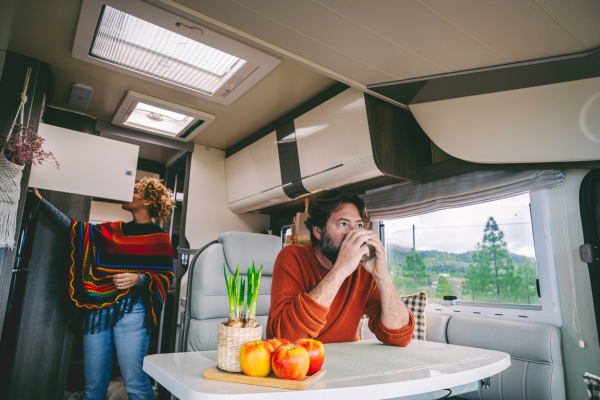Living in an RV full-time is a dream for many, offering freedom, adventure, and the opportunity to explore the open road. However, like any lifestyle, RV living comes with its own set of pros and cons. In this blog post, we'll delve into the advantages and challenges of full-time RV living. Whether you're seeking the freedom of the open road or weighing the practicalities of life on wheels, read on to discover if the RV lifestyle is right for you.
Pros of Full-Time RV Living:
- Freedom and Flexibility: One of the biggest draws of RV living is the freedom to travel wherever and whenever you please. With no fixed address, you can explore new destinations, chase good weather, and change your scenery on a whim.
- Cost Savings: RV living can be more affordable than traditional homeownership, with lower monthly expenses for rent or mortgage, utilities, and property taxes. Additionally, you can save money on dining out by cooking meals in your RV kitchen.
- Minimalism and Simplicity: Living in a small space encourages a minimalist lifestyle, allowing you to declutter, simplify, and focus on what truly matters. Many RVers find joy in downsizing their possessions and embracing a more minimalist mindset.
- Connection to Nature: RV living offers unparalleled access to the great outdoors, allowing you to immerse yourself in nature and enjoy scenic landscapes, hiking trails, and outdoor adventures right outside your doorstep.
- Community and Camaraderie: The RV community is tight-knit and supportive, with opportunities to connect with like-minded travelers, attend RV rallies and events, and build lifelong friendships on the road.
Cons of Full-Time RV Living:
- Limited Space and Storage: Living in a small space requires careful organization and creative storage solutions. Limited storage space can be challenging, especially for those accustomed to larger homes with ample storage.
- Maintenance and Repairs: RVs require regular maintenance and occasional repairs, which can be costly and time-consuming. From engine maintenance to plumbing issues, staying on top of RV maintenance is essential for a smooth travel experience.
- Mobility and Stability: Constantly moving from place to place can be exhilarating but also exhausting. Some RVers struggle with the lack of stability and routine that comes with life on the road, especially if they have family or medical needs that require regular access to healthcare or community resources. RVing with disabilities is still possible but it does take a little extra planning.
- Social Isolation: While the RV community is welcoming and supportive, full-time RVers may experience feelings of social isolation or loneliness, especially if they're traveling solo or spending extended periods in remote locations with limited social interaction.
- Weather and Climate: RV living exposes you to the elements, from extreme heat and cold to rain and snow. Adapting to different weather conditions and climates can be challenging, requiring careful planning and preparation to stay comfortable and safe.
Full-time RV living offers a unique blend of freedom, adventure, and simplicity, but it also comes with its own set of challenges and considerations. Whether you're drawn to the freedom of the open road or the practicalities of minimalist living, it's important to weigh the pros and cons carefully before embarking on this lifestyle. By considering your priorities, lifestyle preferences, and individual needs, you can determine if the RV lifestyle is the right fit for you. We have guides to help you hook up your RV utilities, discover the best RV WiFi options, and avoid common mistakes RV newbies make.
See you on the road!



Share:
A Guide to RVing with Disabilities
Safeguarding Serenity: The Ultimate Guide to Travel Trailer Security